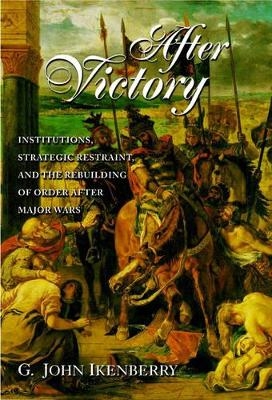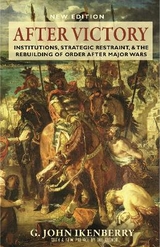
After Victory
Princeton University Press (Verlag)
978-0-691-05091-1 (ISBN)
The end of the Cold War was a "big bang" reminiscent of earlier moments after major wars, such as the end of the Napoleonic Wars in 1815 and the end of the World Wars in 1919 and 1945. Here John Ikenberry asks the question, what do states that win wars do with their newfound power and how do they use it to build order? In examining the postwar settlements in modern history, he argues that powerful countries do seek to build stable and cooperative relations, but the type of order that emerges hinges on their ability to make commitments and restrain power. The author explains that only with the spread of democracy in the twentieth century and the innovative use of international institutions--both linked to the emergence of the United States as a world power--has order been created that goes beyond balance of power politics to exhibit "constitutional" characteristics. The open character of the American polity and a web of multilateral institutions allow the United States to exercise strategic restraint and establish stable relations among the industrial democracies despite rapid shifts and extreme disparities in power.
Blending comparative politics with international relations, and history with theory, After Victory will be of interest to anyone concerned with the organization of world order, the role of institutions in world politics, and the lessons of past postwar settlements for today. It also speaks to today's debate over the ability of the United States to lead in an era of unipolar power.
G. John Ikenberry is Professor of Government and International Affairs at Georgetown University and Non-Resident Senior Fellow at the Brookings Institution. He has published widely in the field of international relations and has, most recently, coedited American Democracy Promotion: Impulses, Strategies, and Impacts and The Emerging International Relations of the Asia Pacific Region (forthcoming). He is the author of Reasons of State: Oil Politics and the Capacities of American Government.
Preface xi Acknowledgments xv CHAPTER ONE The Problem of Order 3 CHAPTER TWO Varieties of Order: Balance of Power, Hegemonic, and Constitutional 21 CHAPTER THREE An Institutional Theory of Order Formation 50 CHAPTER FOUR The Settlement of 1815 80 CHAPTER FIVE The Settlement of 1919 117 CHAPTER SIX The Settlement of 1945 163 CHAPTER SEVEN After the Cold War 215 CHAPTER EIGHT Conclusion 257 Appendix 275 Index 283
| Erscheint lt. Verlag | 5.11.2000 |
|---|---|
| Reihe/Serie | Princeton Studies in International History and Politics |
| Zusatzinfo | 3 line illus., 12 tables |
| Verlagsort | New Jersey |
| Sprache | englisch |
| Maße | 152 x 235 mm |
| Gewicht | 454 g |
| Themenwelt | Geisteswissenschaften ► Geschichte ► Allgemeine Geschichte |
| Sozialwissenschaften ► Politik / Verwaltung ► Europäische / Internationale Politik | |
| Sozialwissenschaften ► Politik / Verwaltung ► Politische Theorie | |
| ISBN-10 | 0-691-05091-0 / 0691050910 |
| ISBN-13 | 978-0-691-05091-1 / 9780691050911 |
| Zustand | Neuware |
| Haben Sie eine Frage zum Produkt? |
aus dem Bereich



